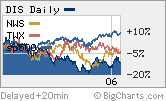|
Media tries to regain its mojo
More media mergers are likely in the near future. Are deals the answer to the sector's problems?
NEW YORK (CNNMoney.com) – Several major media companies are set to report quarterly results in the next few weeks. But the earnings are likely to take a back seat to more speculation about the rapid pace of wheeling and dealing in the industry. Last week saw two significant mergers. Walt Disney (Research) is buying animated studio Pixar (Research) for $7.4 billion, a move that Disney hopes will restore its own cartoon movie franchise to its former glory.
CBS (Research) and Time Warner (Research) announced that they are going to merge their struggling TV networks, UPN and the WB, to create a network that will begin airing in September. This network, dubbed the CW, will target 18-34 year olds. (Time Warner also owns CNNMoney.com.) And these deals come on the heels of last month's announcement that Viacom (Research) was buying DreamWorks SKG as well as the news that Google (Research) was buying a 5 percent stake in Time Warner's AOL unit for $1 billion. Just the beginning
Experts expect more media makeovers in the near future. "The industry is so fiercely competitive. Everyone is focused on how to maximize profits and best use assets," said Rik Toulon, a partner in the entertainment practice at law firm Katten Muchin Rosenman LLP. "It's pretty frenetic out there." Time Warner, which will report on Feb. 1, has come under pressure from activist shareholder Carl Icahn to take drastic steps to boost shareholder value. Icahn has suggested that Time Warner spin-off all of the company's cable business. According to several reports, Icahn may also be interested in getting Time Warner to sell its publishing unit and the dial-up business of AOL. Disney will report on Feb. 6 and News Corp. on Feb. 8. News Corp. (Research) has been busy scooping up online media firms such as Intermix Media, the parent of social networking site MySpace, and online video game firm IGN. Each company is expected to report decent, but not spectacular, results for the current quarter, all of 2006 and beyond. Revenue growth for Time Warner, Disney and News Corp. is expected to be in the single digits for both this quarter and the full year. Analysts are forecasting annual profit growth in the mid-teens, on average, for the next few years. So transactions like Disney's purchase of rapidly growing Pixar and News Corp.'s online expansion may be the only way to get investors excited again. "These companies need to somehow change the perception that old media is passé," said Joe Bonner, an analyst with Argus Research. "Old media is trying to grab on to the new generation of media properties." Another merger expert said that more media deals are inevitable as consumers increasingly adopt new methods to view content, be that through the Internet or portable digital devices like Apple's (Research) ubiquitous iPod. "Technology is driving the media marketplace and deals are limitless because the technology is not slowing down anytime soon," said Bill Abrams, a partner focusing on entertainment and corporate law with law firm Abrams Garfinkel Margolis Bergson, LLP. "The end game is to exploit distribution streams." Abrams argues that even the WB-UPN merger is an offshoot of technology. With so many options for TV viewers, be that through the major networks, cable/satellite and the Web, more media firms may find that one way to try and boost audiences is to combine weaker networks. "There is too much programming out there so mergers are a natural progression," Abrams said. Deals make sense...but does media need to keep an eye on telecoms?
One analyst said that the recent round of deals could eventually boost the lagging share prices of media firms. "One of the reasons shares of traditional media companies have underperformed so much is the fear that they would not adapt to the new technologies and that they would not grow as much," said Alan Gould, an analyst with Natexis Bleichroeder. "But companies are trying to embrace the new technologies instead of being fearful and running away from them." And Robin Diedrich, an analyst with Edward Jones, added that one thing that is encouraging about the recent round of mergers is that they are not just being done in order to get bigger. Disney's purchase of Pixar, for example, should strengthen its movie business, she argues. "The deals we are seeing now are a little bit smarter and are in line with key strategies," Diedrich said. But looking ahead, mergers may not be limited to just the old-school media firms. Toulon thinks that mainstream media companies may have competition from, or even become the targets of, telecoms in the not so distant future. After all, the telecoms are increasingly targeting video as a means for growth and are becoming more and more like cable companies by the day. In addition to Time Warner, Comcast (Research) and Cablevision (Research) also both own cable programming and distribution. And Comcast did make an unsolicited takeover bid for Disney back in 2004. So why wouldn't major telecoms like Verizon (Research) and AT&T (Research) follow the same path? "More content is going wireless and as we start seeing more of that, how are the telcos going to fit into consolidation?" said Toulon. "Will the telcos be interested in content? We could see history repeat itself." Abrams agreed that it wouldn't be a surprise to see telecom firms make a play for a media company at some point. "I wouldn't rule out telecoms. I'd be surprised if they're not already looking at the content business. They're going to have to in order to survive," he said. Old media still matters in Davos. Click here. CBS may sell its theme park business. For more, click here. ------------------------------- Natexis' Gould owns shares of CBS, Viacom and News Corp. but his firm has no investment banking ties to the companies. Other analysts quoted in this piece do not own shares of the companies and their firms have no investment banking relationships with them.
The reporter of this story owns shares of Time Warner through his company's 401(k) plan. |
| |||||||||||||||||||||||||||||||||||||||||||||||||||||||||||||||||||||||||||||||||||||||||


